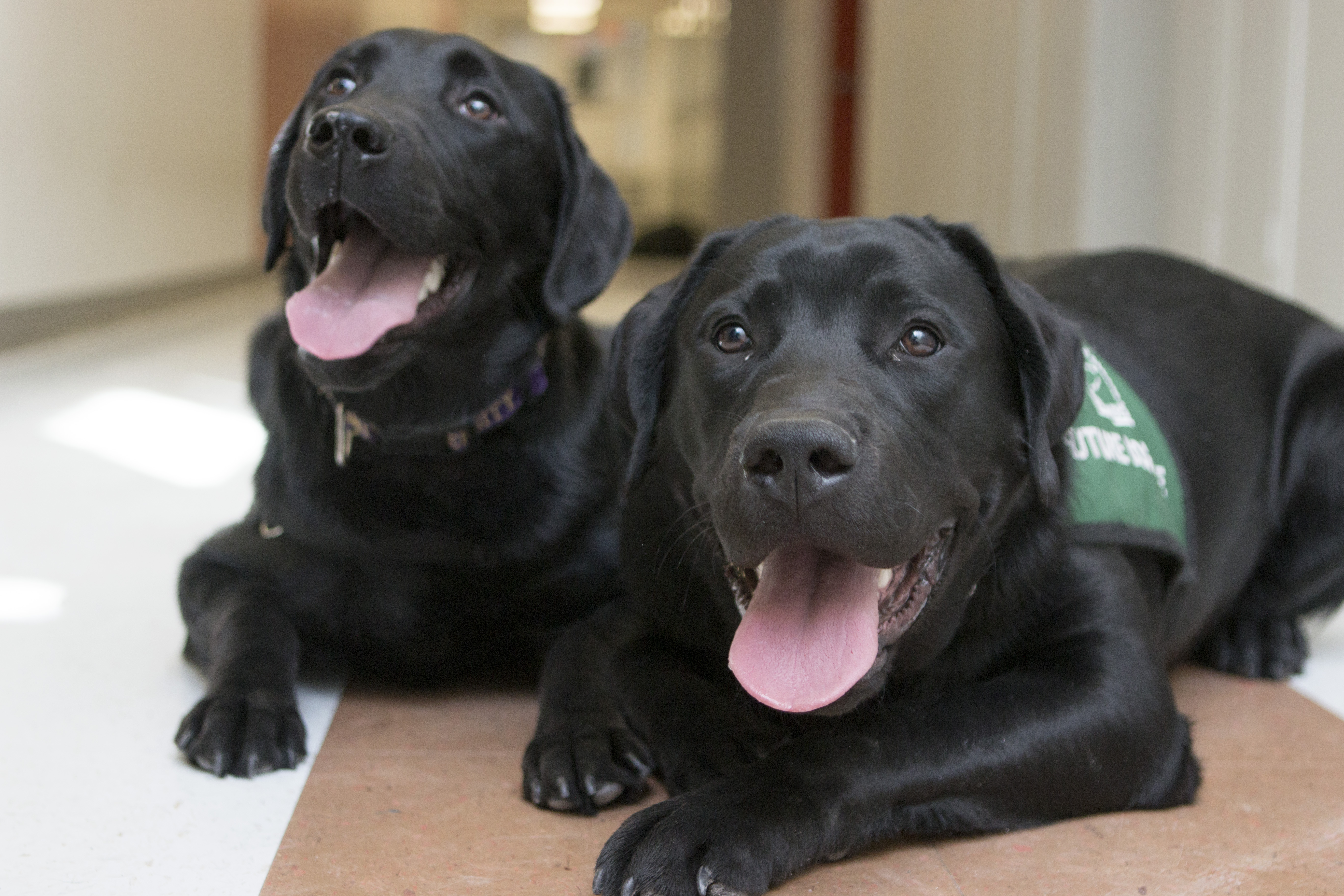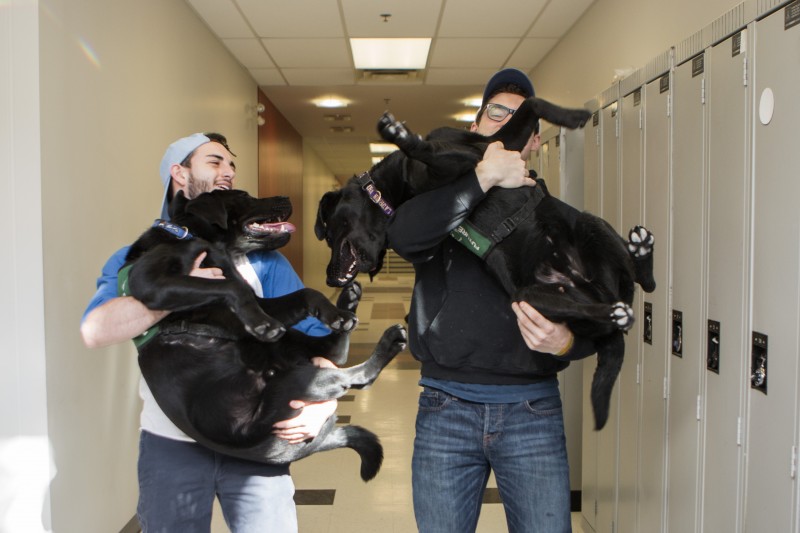Big paws on campus

In the past year there has been a noticeable trend on the Wilfrid Laurier University’s campus.

In the past year there has been a noticeable trend on the Wilfrid Laurier University’s campus. A number of students have been spotted with adorable Labrador retriever puppies in green vests, which they have volunteered to foster and train to be guide dogs.
Fifth-year David Bunce, fourth-year Zack Honarvar and fourth-year Mary Crawford are all proud foster parents of black lab puppies Derby, Emmett and Farrah, respectively. When it came to deciding whether or not he should get involved in the Lions Club of Canada guide dogs program, Honarvar found it was an easy decision.
“A girl in my program did it last year and she was the only person at Laurier who had done it that year. At first I thought it would be a bad idea, that maybe the dog would bark in class, but I had all my classes with her and the dog was always well behaved,” he explained.
He wanted a dog but he and his family found them to be costly. Therefore, the foster program through the Lions Foundation seemed to be a perfect fit.
“I thought if she could do it, I could do it,” he said.
Bunce and Crawford also recognized this particular student as sparking their interest to get involved in the foster puppy program.
Bunce explained that to participate in the program he filled out an application online.
“If they go through your application and they like you, [they do] a home interview where they essentially just come to your house and sit you down … and they will talk to you about what you’re getting into,” he said.
Jenny Gladish, communications manager of Lions Foundation of Canada, explained that there are guide dogs to assist people living with several different kinds of disabilities including visual and auditory impairments, physical disabilities, epilepsy, diabetes and autism.
Gladish continued that the dog training starts from birth. The foster families are expected to take on the basic training of the puppy: obedience, manners and socialization. She also said a university setting is a great place to begin guide dog training.
“Campuses are communities … a lot of our clients go to schools … so it makes sense that [the puppies] would get exposed to an institution at an early age,” Gladish said.
Crawford explained there was some hesitation before bringing Farrah into the classroom.
“I was really nervous at first because when I first contacted my professors asking for permission to bring her to class, a lot of them said that they didn’t want it to affect my studies,” she said.
“I was kind of nervous that was going to happen, so I was really diligent on the training to make sure that she was really well-behaved in class,” she continued. “She just associates classrooms with sleeping now.”
Crawford said having Farrah in her life has made a positive impact on her and her presence has added a sense of relief and tranquility.
“I think my mental health has improved. I mean not that I was struggling, but I’m getting out more, not just spending my days at home,” she said.
“She’s even sat in on my exams and my midterms and she sat on my feet once during an exam. Not that I get a lot of anxiety, but I think everyone has a certain level of anxiety or stress while writing exams and it really helped having her there.”
Honarvar also said fostering Emmett has impacted his life as a student. The bond between the two is evident and has drawn a lot of attention on campus.
“Socially, [having Emmett] has given people a reason to come up to me and get to know me. I’ve met a lot of people [because of Emmett],” Honarvar said.
“Academically, I would say that my marks have taken a hit because I have a dog and he is like another class. In my life in general, he is a stress reliever. It’s great coming home to him. He always greets me when I’m at the door and on rough days he always makes me feel better.”
Though Honarvar has benefitted socially from caring for Emmett, many guide dog foster parents’ social lives can take a hit. Bunce said he often has to think about how Derby will be affected if he goes somewhere he isn’t able to go.
“If you try to go out or something you have to try to figure out what you’re going to do with the dog, like if someone is going to babysit him,” he said. “You also have to make sure to get him out for a nice long run before you go out anywhere.”
Though these future guide dogs are mostly well-behaved, each of them has a very distinct energy. Derby is high strung while Emmett is calm, gentle and docile, according to Bunce and Honarvar.
A dark, looming cloud over the experience of fostering a guide dog is that your relationship with the animal will eventually come to an end. The organization normally recalls the dogs when they are between 10 and 12 months of age. Crawford, Bunce and Honarvar are expected to give back Farrah, Derby and Emmett sometime in April.
“[Farrah] did a six-month assessment, which is like the chopping block for if those dogs are going to be considered for the program or not,” Crawford said. “When they told me [Farrah passed] it was like my last shred of hope that I’d get to keep her. Not that I’d want that, but secretly a part of me is like, ‘Ah, I want to keep her so bad!’”
Bunce said he has been prepared for the time when he would have to give Derby back from the beginning of the program.
“I knew getting into this that I would have to give him up. If I had to give away my dog at home, it would be a lot more traumatic. When I got Derby, I knew that day would come,” he said. “It feels good to know that he’s going off to help someone. It makes it a little bit easier.”
Honarvar on the other hand has formed a strong bond with Emmett, making the idea of giving him up in April difficult to talk about.
“[It makes me feel] like shit,” he said. “For the longest time I was convinced that I was going to buy him out of the program, but then I figured it would be selfish of me. He has potential and I know he has the potential to change someone’s life.”
Cambridge resident Laura Banks knows the process of giving up foster puppies all too well. She and her family have fostered — and given up — two puppies.
Upon giving up their most recent dog Hawk, who they fostered for approximately nine months, Banks and her parents were under the impression that Hawk would go on to help an autistic child out west. However one night they received a huge surprise.
“It’s amazing,” Banks said. “We were watching the news one night and all of a sudden … it popped up. My mom and I started screaming out of pure excitement.”
Due to Hawk’s docile temperament, he became one of the first court dogs in Alberta to help assist police in child molestation investigations because the presence of a dog in a courtroom environment can be comforting for children. An article by CBC News explained that Hawk had been requested to sit in on several court cases involving children who had experienced traumatic events, including a seven-year-old girl who’s father was accused of molesting her.
“Molested children are more likely to open up to animals than adults in uniforms or suits and ties,” Banks explained.
Seeing Hawk helping those in need provided closure for Banks and her family. If they hadn’t given him up, he would have never made it out to Alberta to provide the service he was trained to give.
“We ended up getting the officer’s name and we actually emailed him and he emailed back,” Banks said. “It’s rewarding when the officer in charge of the dog tells us that he knows that [Hawk] was loved and that he was raised by good people.”
Honarvar, Bunce and Crawford all agreed the program is not for everyone. As glamourous as it may seem, it comes with great responsibility.
“Make sure you know what you’re getting into. You’re going to be cleaning a lot of poop and pee. The first month or two that you have them, as cute as they are, it can be a pain. But if you love dogs you’ll love [the program],” Bunce said.
Like Bunce, Honarvar had similar ideas when it came to offering advice to prospective foster parents.
“Don’t do it for the wrong reasons. A dog is a lot of work. Make sure that you have the support and cooperation of your family and roommates. If your roommates aren’t open to the idea or of helping out, then maybe think about it a little longer,” he said.
While she agreed with Honarvar, Crawford, said you have to follow your gut when making the decision of whether or not you should foster a puppy.
“I got a lot of negativity when I first pitched the idea to my parents and my friends. I found it quite the opposite of what everyone was telling me … so far it’s only been positive,” Crawford said.
“I would encourage people that despite other people’s discouragements, that it’s very much worthwhile in the end and it’s not as demanding as you think, as long as you go in there knowing what you’re doing.”


